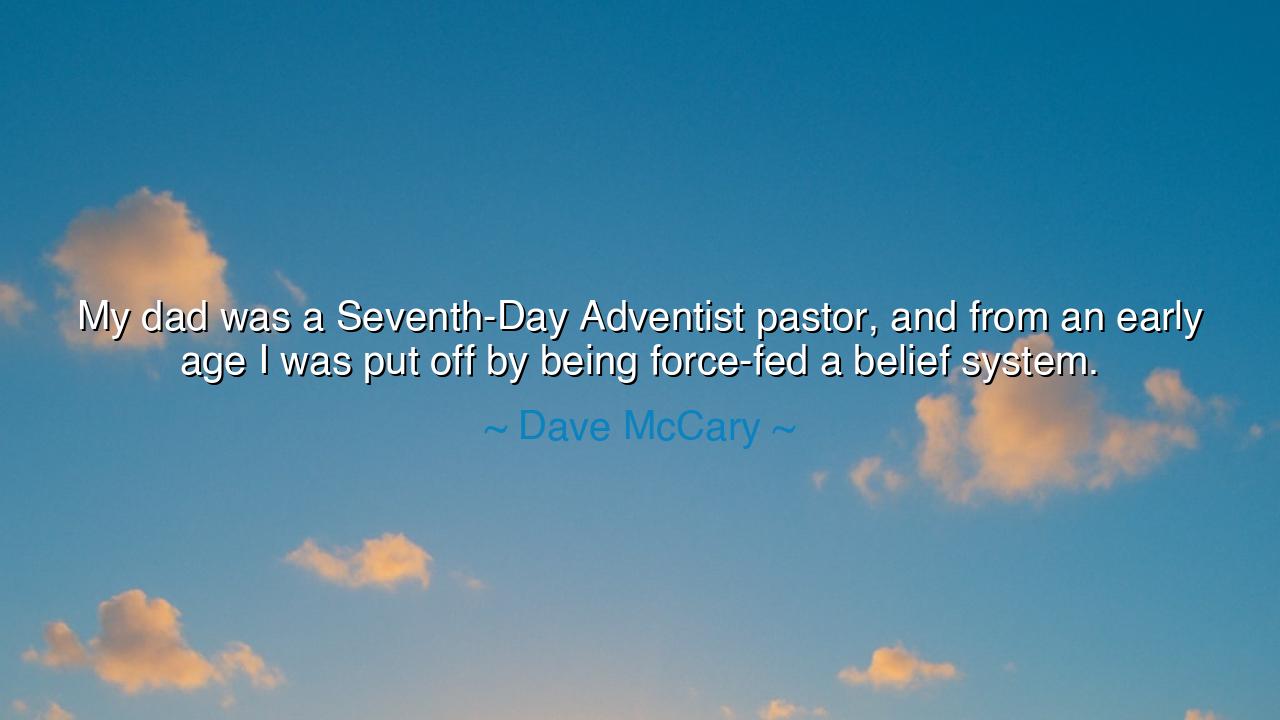
My dad was a Seventh-Day Adventist pastor, and from an early age
My dad was a Seventh-Day Adventist pastor, and from an early age I was put off by being force-fed a belief system.






In the great expanse of human experience, there are moments when the imposition of belief and doctrine upon the young soul feels like a weight too heavy to bear. Dave McCary, in reflecting upon his upbringing, shares: "My dad was a Seventh-Day Adventist pastor, and from an early age I was put off by being force-fed a belief system." These words capture the struggle that many face when they are bound by the beliefs of others, forced to accept a truth not of their own making. There is a deep tension between the impartation of faith and the freedom to seek one's own path, a tension that often becomes the crucible in which personal identity is forged.
What, then, does it mean to be force-fed a belief system? To be forced into the mold of another's faith is to have one's soul stifled, to feel as though one’s mind is locked in a prison of doctrine, unable to explore the vast landscape of thought that the world offers. From a young age, McCary was steeped in a belief that was not chosen but imposed upon him. The essence of this experience is not simply about rejecting the beliefs of others, but about the desire to understand and forge one's own beliefs through experience, reason, and reflection. To be told what to believe without the freedom to question is a burden that many feel deeply, for it denies the soul the opportunity to grow in its own truth.
In ancient times, the quest for truth was often seen as a sacred endeavor, one that was to be pursued by each individual, not simply inherited from parents or society. The great philosophers of Greece, such as Socrates, spent their lives questioning the very foundations of belief, urging others to seek knowledge not through blind acceptance, but through reason and personal inquiry. Socrates, in his famous declaration that "the unexamined life is not worth living," emphasized the importance of self-reflection and the examination of one’s beliefs. For him, to be force-fed a belief system was not just an obstacle—it was a denial of one’s humanity, for it took away the power to question and learn.
Consider also the story of Martin Luther, the great reformer who broke from the Catholic Church in the 16th century, protesting against the practices and doctrines that he believed were corrupt. Luther’s 95 Theses were not simply a rejection of a church’s teachings, but a cry for individual faith—for the right of every person to interpret the divine through their own understanding, free from the restrictions of dogma. His rebellion was not against faith itself, but against the oppression of blind adherence to a system that stifled personal growth and understanding. Like McCary, Luther’s journey was one of liberation, of breaking free from the chains of inherited beliefs to embrace a more personal, more authentic relationship with the divine.
The lesson that McCary’s words offer us is one of profound significance: the freedom to believe is a sacred right that must not be imposed upon others, especially the young. Children, though they may be taught the values of their parents, must also be given the space to question, to explore, and to form their own beliefs as they grow. It is through this process of discovery, of learning from a vast array of experiences and teachings, that one’s true faith emerges—not as a blind inheritance, but as a living, breathing part of one’s soul.
In our own lives, we must reflect on the influence we have over others, especially the younger generation. Are we guiding them to think for themselves, to seek truth, or are we merely passing down beliefs without encouraging them to form their own understanding? Like the ancient philosophers, we must be mentors, not dictators of belief. Our role is to guide others to question, to seek, and to find the truth that resonates deeply within them, not simply the truths that have been handed down to us. We must encourage others to embark on their own journeys of self-discovery, where the freedom to question leads to a more authentic and fulfilling life.
Therefore, let us honor the right to choose our beliefs, to cultivate a world where the next generation is not bound by the weight of inherited dogma, but is free to seek the truth that will guide them toward a life of meaning and purpose. Let us remember that to be truly free is to have the courage to question, to learn, and to form beliefs not from the force of others, but from the depth of our own hearts. In doing so, we will create a world where faith is not an imposition, but a choice—a choice that each individual makes with the wisdom of their own experiences.






AAdministratorAdministrator
Welcome, honored guests. Please leave a comment, we will respond soon